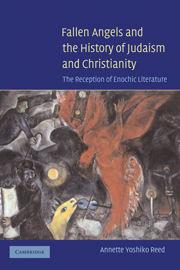Book contents
- Frontmatter
- Contents
- Preface
- List of Abbreviations
- Fallen Angels and the History of Judaism and Christianity
- Introduction
- 1 Angelic Descent and Apocalyptic Epistemology: The Teachings of Enoch and the Fallen Angels in the Book of the Watchers
- 2 From Scribalism to Sectarianism: The Angelic Descent Myth and the Social Settings of Enochic Pseudepigraphy
- 3 Primeval History and the Problem of Evil: Genesis, the Book of the Watchers, and the Fallen Angels in Pre-Rabbinic Judaism
- 4 The Parting of the Ways? Enoch and the Fallen Angels in Rabbinic Judaism and Early Christianity
- 5 Demonology and the Construction of Christian Identity: Approaches to Illicit Angelic Instruction among Proto-Orthodox Christians
- 6 The Interpenetration of Jewish and Christian Traditions: The Exegesis of Genesis and the Marginalization of Enochic Literature
- 7 The Apocalyptic Roots of Merkabah Mysticism? The Reemergence of Enochic Traditions in Rabbinic Judaism
- Epilogue
- Bibliography
- Index of Modern Authors
- Index of Primary Sources
- Subject Index
1 - Angelic Descent and Apocalyptic Epistemology: The Teachings of Enoch and the Fallen Angels in the Book of the Watchers
Published online by Cambridge University Press: 17 August 2009
- Frontmatter
- Contents
- Preface
- List of Abbreviations
- Fallen Angels and the History of Judaism and Christianity
- Introduction
- 1 Angelic Descent and Apocalyptic Epistemology: The Teachings of Enoch and the Fallen Angels in the Book of the Watchers
- 2 From Scribalism to Sectarianism: The Angelic Descent Myth and the Social Settings of Enochic Pseudepigraphy
- 3 Primeval History and the Problem of Evil: Genesis, the Book of the Watchers, and the Fallen Angels in Pre-Rabbinic Judaism
- 4 The Parting of the Ways? Enoch and the Fallen Angels in Rabbinic Judaism and Early Christianity
- 5 Demonology and the Construction of Christian Identity: Approaches to Illicit Angelic Instruction among Proto-Orthodox Christians
- 6 The Interpenetration of Jewish and Christian Traditions: The Exegesis of Genesis and the Marginalization of Enochic Literature
- 7 The Apocalyptic Roots of Merkabah Mysticism? The Reemergence of Enochic Traditions in Rabbinic Judaism
- Epilogue
- Bibliography
- Index of Modern Authors
- Index of Primary Sources
- Subject Index
Summary
BEFORE EXPLORING THE JEWISH AND CHRISTIAN TRANSFORMAtions of the Enochic myth of angelic descent, we must first ask how the fallen angels and their teachings function within the Book of the Watchers itself. Our inquiry into the reception-history of this apocalypse necessitates a focus on the redacted form of the text, the form in which (most) Jews and Christians would encounter it. In light of its complex literary history, however, the contents of the apocalypse cannot be addressed apart from some discussion of the strands from which it has been woven.
As noted above, the Book of the Watchers appears to integrate at least five originally independent units into the larger narrative framework of an apocalypse. Some of these units are themselves composite, constructed from threads of even more ancient texts and/or traditions. In the apocalypse's present form, the combination and arrangement of these parts have resulted in the integration of traditions about two events with no connection in the book of Genesis: Enoch walking with God and being taken by Him (Gen 5:21–24) and the “sons of God” choosing wives from the “daughters of men” (Gen 6:1–4).
The first unit, 1 En. 1–5, establishes Enoch's status as a visionary with unique access to heavenly knowledge and records his exhortations about the value of cosmological phenomena as models for ethical behavior. The second, 1 En. 6–11, wholly concerns the fallen angels.
- Type
- Chapter
- Information
- Fallen Angels and the History of Judaism and ChristianityThe Reception of Enochic Literature, pp. 24 - 57Publisher: Cambridge University PressPrint publication year: 2005



